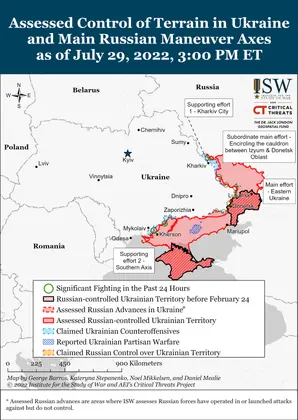Key Takeaways
- A kinetic event killed and wounded scores of Ukrainian POWs in Russian-occupied Donetsk Oblast on July 28. Ukraine and Russia are blaming each other for the attack. Available visual evidence appears to support the Ukrainian claim more than the Russian, but ISW cannot independently assess the nature of the attack or the party responsible for it at this time.
- Ground fighting continued north of Kharkiv City with no significant change in control of terrain.
- Russian forces attempted a limited ground assault in Kherson Oblast and continued conducting combat operations without creating strike groups along occupied lines.
- Russian regional outlets reported the recruitment and establishment of an additional volunteer battalion in the Republic of Buryatia and the formation of a reserve battalion in Novosibirsk.
- Members of Russian President Vladimir Putin’s United Russia party traveled to occupied Ukrainian territories to promote an organization called “We Are Together with Russia,” likely to present the façade of a “grassroots” call for the Russian annexation of occupied Ukraine and to prepare for falsified annexation referenda.
A kinetic event killed and wounded scores of Ukrainian POWs in Russian-occupied Olenivka, Donetsk Oblast, on July 28.
JOIN US ON TELEGRAM
Follow our coverage of the war on the @Kyivpost_official.
Ukraine and Russia are blaming each other for the attack and available visual evidence appears to support the Ukrainian claim more than the Russian, but ISW cannot independently assess the nature of the attack or the party responsible for it at this time. The Russian Defense Ministry asserted that Ukrainian forces deliberately struck the Olenivka pre-trial detention center holding Ukrainian POWs including Azov Regiment servicemen using Western-provided HIMARS, killing at least 40 and wounding 75 POWs.
Kremlin-sponsored news outlet “RIA Novosti” published videos of the detention center, which showed fire damage but not the sort of damage that a HIMARS strike would likely have caused. RIA Novosti also released footage of HIMARS missile fragments but provided no evidence that the fragments were recovered at Olenivka. Luhansk People’s Republic (LNR) Ambassador to Russia Leonid Miroshnik claimed that Ukrainian forces struck the pre-detention center to eliminate the evidence of Ukrainian surrenders and prevent POWs from speaking out against the Ukrainian government.
The Ukrainian General Staff said that Russian forces conducted the attack as a false flag operation to cover up Russian war crimes, disrupt the supply of Western weapons, discredit Ukrainian forces, and stoke social tensions within Ukrainian society. The Ukrainian General Staff stated that a deliberate explosion occurred near the newly-constructed penal colony, to which Russian forces had transferred Ukrainian POWs a few days earlier.

ISW Russian Offensive Campaign Assessment, November, 26, 2024
The Ukrainian General Staff also noted that Ukrainian analysis of the damage to the building, intercepted phone conversations between Russian servicemen, the lack of reported shelling in Olenivka, and the absence of casualties among Russian personnel serving at the penal colony all point to a Russian deliberate “terrorist act” as the cause of the incident. The Ukrainian Main Military Intelligence Directorate (GUR) accused Wagner Group head Yevgeny Prigozhin of ordering the “terrorist act” without consulting with the Russian Defense Ministry, to conceal the embezzlement of funds allocated for the maintenance of Ukrainian POWs before an official inspection on September 1.
The Ukrainian Office of the General Prosecutor reported that the explosion killed at least 40 and wounded 130 Ukrainian POWs.
ISW is unable to assess the nature of the event or the party responsible for it with any confidence at this time. We will update our assessment as more information becomes available.
Authors: Kateryna Stepanenko, Karolina Hird, Grace Mappes, Layne Phillipson, Katherine Lawlor, and Frederick W. Kagan
Read the full report here.
You can also highlight the text and press Ctrl + Enter






